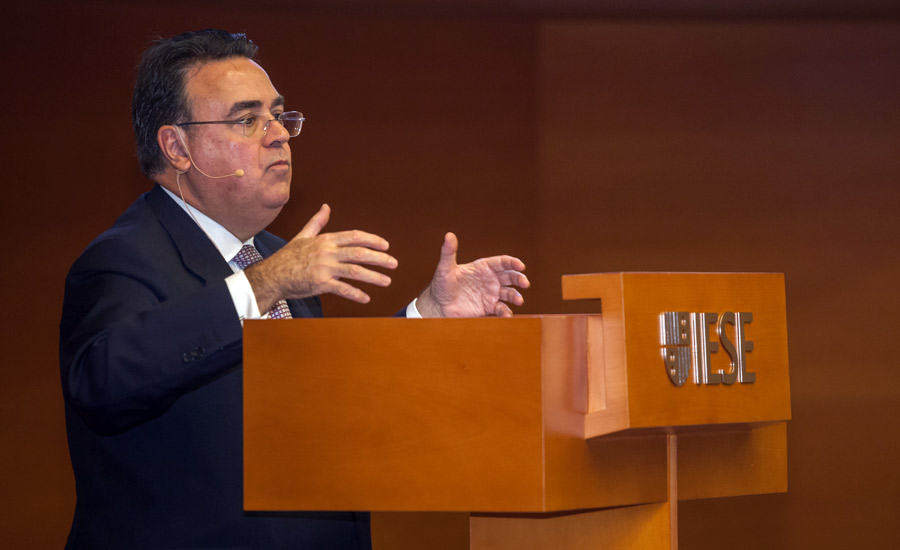
Speaking at IESE’s Barcelona campus last week, Antonio Llardén, executive chairman of Enagás, set out how unpredictable the energy business is – and how despite the challenges, the Spanish gas company has transformed itself and its fortunes.
The company has increased its share price by 53 percent, while at the same time the IBEX average shrunk by 26 percent. It has also upped both its Standard & Poor and Fitch ratings have gone from BBB to A-. All in just eight years.
From National to Global
One of Europe’s leading energy companies, Enagás is now the world leader in liquefied natural gas (LNG) and the main gas carrier in Spain, with operations in seven other countries in Europe and Latin America.
This is all the more impressive considering the recent volatility that the energy business has experienced. Volatility that Llardén’s company has met head-on, by breaking out of a reliance on Spanish shareholders, banks and markets, and going global.
Achieving this took firm decision-making, and no small amount of humility, said Llardén. The first step was an understanding of the energy business within the context of wider social, political and technological change.
Global Perspectives for a Business Without Borders
According to Llardén it’s impossible to be a leader in the energy sector without understanding the socio-political context. And you need a worldwide vision, as energy is a business without borders.
A good illustration of this is the current warming of relations between Iran and Europe. “This could lead to the country exporting oil and gas westwards in a matter of years,” says Llardén.
Another development in the pipeline is the proposed common European energy policy. Currently, the European Union member states get 40 percent of their natural gas piped from Norway and Russia.
In order to reduce dependence on these suppliers, the new policy is suggesting an increased use of LNG, Llardén explained. Liquefying natural gas reduces its volume 600 times, making bulk transportation of the fuel more practical and allowing Europe to import it from anywhere in the world.
As Enagás owns and operates six out of the eight plants on the Iberian Peninsula that convert LNG back to natural gas, it is well positioned to take advantage of this.
Unpredicted Developments and Humility
The case of shale gas is an example of sudden technical change affecting the energy market. In 2006, when Llardén was chair of the World Energy Congress, only a handful of people knew anything about the subject. Yet only a few years later it had profound implications for their sector.
Another event that caught the industry by surprise was the drop in oil price from around 80 dollars to the current price of about 50 dollars per barrel. The key is to be “humble,” said Llardén, “no-one was able to predict this.”
Need for Decisive Action
But rapid and often unforeseen developments affecting an industry don’t just require humility – they require decisive action. “The energy business is seen as having a lot of inertia,” he said. Enagás shook off this perception by transforming itself – without shedding staff.
Enagás’ reaction to the volatility in the energy industry and the financial crisis was to “become more efficient, look for markets outside of Spain, attract foreign investment and shareholders, and modify the company’s internal structures,” Llardén said.
Seeking Shareholders and Markets Worldwide
Previously, Enagás had been highly dependent on Spanish shareholders, the goodwill of Spanish banks and the health of Spanish energy markets. As the global economic crisis took its toll on all three, the company took action.
It wooed foreign investors. With the result that 90 percent of its share capital is now free float, with investors spread worldwide. Expansion into other European markets, plus Latin America, means the company is now a genuine global operation.
Corporate Pride, Collective Effort
Llardén stressed the need for collective effort within a company and the value of teamwork in the face of challenge. “Clear, strategic thinking is a result of teamwork, rather than individual geniuses,” he said.
The Enagás Executive Chairman was joined by an audience of MBA and EMBA students at IESE.